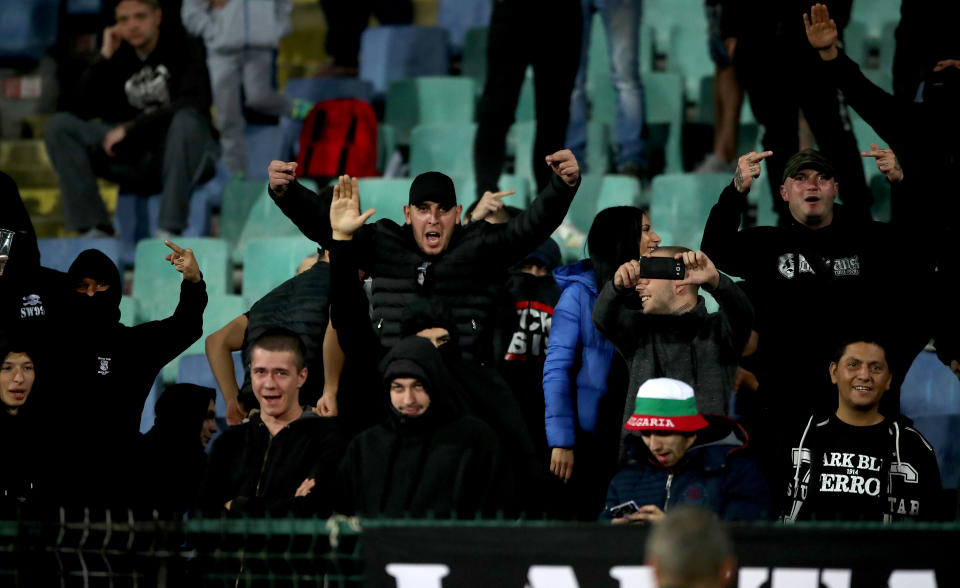Points deductions and 100-year stadium bans: Let's get serious about punishing racism in soccer

When the English top flight was rebranded as the Premier League in 1992, it came as a reaction to the “dark days” of soccer in the country.
In the 1980s, stadiums were unsafe and dilapidated, hooliganism was rife with issues and racism was par for the course. In 1982, Chelsea’s first black player Paul Canoville suffered racist abuse from his own team’s fans. In 1988, a famous image showed Liverpool forward John Barnes backheeling a banana from the field in a Merseyside derby. And West Brom’s Cyrille Regis also had bananas thrown at him — and was sent a bullet in the mail when he received his first England call-up.
In many ways, the Premier League has sanitized the game and made the “dark days” seem like a distant memory. Teams put on a high-quality product in sparkling stadiums with year-round bowling green fields, while the social issues surrounding hooliganism have all but dissipated.
Despite all the advances made in the sport and society, racism hideously lingers.
This season, a number of racist incidents have come to light in England and across Europe. In December’s match between Tottenham and Chelsea, Antonio Rüdiger reported racist abuse, which led to two announcements in the stadium warning that “racist behavior is interfering with the game.”

UEFA, European soccer’s governing body, has a three‑step protocol that dictates a game can be abandoned if fans have been warned twice. But this game continued to its conclusion. Despite the prevalence of high-quality surveillance in the stadium, this week Tottenham concluded that there was no evidence that any racist incidents took place.
Two weeks prior to the Rüdiger incident, the cameras were trained on the controversy when a fan at the Manchester derby was caught making racist gestures. The 41-year-old perpetrator was arrested the following day and released on bail the day after.
Another incident in December saw a Burnley fan ejected from Tottenham’s stadium for an alleged racist gesture at Spurs forward Son Heung-min. The fan was 13.
Elsewhere in Europe, England’s 6-0 win in Bulgaria in Euro 2020 qualification had to be stopped twice for racist chanting from the home fans, who were also pictured giving Nazi salutes. Bulgaria manager Krasimir Balakov claimed to not have heard any abuse at the stadium, despite it being clear for most traveling fans and TV viewers who could hear it on the pitch-side microphones.
UEFA’s punishment for the Bulgarians was a single-game stadium ban for fans and a $94,000 fine. Many have been quick to point out that this fine was less than Nicklas Bendtner was charged for wearing underwear with the name of an online bookmaker.
The message here? In UEFA’s eyes, one man contravening commercial interests is more egregious than a stadium engaging in racist behavior.
There is also an enormous problem in Italy, where Mario Balotelli has been continually victimized by racist behavior, most recently from Lazio fans over the weekend. When Balotelli was abused at Hellas Verona earlier this season, Serie A decided the appropriate punishment was a one-game partial stadium closure.
And Inter Milan striker Romelu Lukaku has been racially insulted by everyone from opposing fans to TV pundits to newspaper headline writers, and he didn’t even have the support of his own club chairman.
Are you noticing the pattern?
It seems that Europe’s leagues and UEFA are handing down disproportionately small sanctions for an issue that is blighting the game.
It is obvious that monetary punishments are ineffective for wealthy teams who might treat them as a minor expense. And partial stadium bans are a slap on the wrist for behavior that has absolutely no place in our society.
(It is also a separate issue that law enforcement is not acting effectively. In the UK, for example, racially aggravated behavior can result in a six-month prison sentence and 10-year ban from soccer stadiums under the Public Order Act. However, the previous example of the guilty fan at the Manchester derby, who was released after a day in custody, shows that the full extent of the law is not being exercised.)
Punishments for racist behavior in the game need to be severe. They need to act as a deterrent, so that no fan, in any country, will feel emboldened enough to stand among thousands of people and act in an abhorrent way.
The punishments must hit the offending fans with real consequences: for them, and their team.

Perhaps the most effective way of dealing with the issue is via points deductions and automatic competition elimination.
If Bulgarian fans are guilty of racist behavior in a qualifier, then ban them from Euro 2020. If Hellas Verona have a deep-seated culture of racist activity at their games, give them a 10-point deduction in Serie A and see how quickly that culture changes.
If fans know that their bad behavior can have a direct effect on the prosperity of their team, then surely progress will be made. Who wants to be the idiot who got their team relegated or thrown out of a competition?
Secondly, the stadium bans for offending fans should be more severe. A 10-year ban is surmountable — why not instill 100-year bans, which will affect an offender’s children and their children?
Punishing the child for the sin of a parent may seem harsh, but denying the legacy of supporting a team through generations sends a very loud message to anyone who may think racist behavior is acceptable.
Once again, the consequences must be severe for the punishment to be effective.
“It’s a problem that won’t go away until the correct punishments are handed out,” former Manchester United star Gary Neville said on Sky Sports in the aftermath of the Manchester derby.
In the same clip, Neville expands on the idea that the behavior in the stands is merely a reflection of society as a whole. In a world where nationalist ideologies are becoming more popular and powerful politicians use divisive rhetoric, it is inevitable that some will feel it is appropriate to espouse racist views from the stands.
Perhaps it is for this reason that more investment must also be made in education. Instead of UEFA dedicating Matchday 3 of every Champions League campaign to fighting racism, why not explicitly dedicate every matchday to the cause? When clubs are handed fines, why not make them 10 times larger and give the entire amount to organizations like Kick It Out, which puts a strong emphasis on education in their remit.
Racism remains a serious issue in the game, and if we are to truly escape the shadow of soccer’s “dark days,” we must take serious action.
More from Yahoo Sports:


